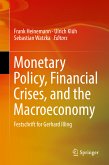Prof. Federico Etro teaches macroeconomics at the University of Milan, Bicocca and industrial organization at the University of Edinburgh for the Scottish Graduate Programme in Economics. He studied at the U.C.L.A. and Harvard, and wrote articles for American Economic Review, International Economic Review, Economic Journal, Journal of Macroeconomics, Public Choice and the book "Competition, Innovation, and Antitrust" (2007, Springer).
Etro reviews the EMSs approach to macroeconomics and derives several new results. The potential of this approach to change the way we think about the macroeconomy emerges clearly from the impressive range of topics to which it is successfully applied. In each case, the approach challenges the traditional view and policy implications. Etro's discussion of the EMSs approach in the context of a coherent and comprehensive analytical framework provides an invaluable service to the profession.
Pietro Peretto, Duke University
For many decades, the field of industrial organization lived in the world of microeconomics, separately from the macroeconomic world of economic growth and business cycles. In recent years we have seen a fruitful convergence of the two. This book is a very useful contribution to this literature.
Avinash Dixit, Princeton University
A must read for macroeconomists and international economists who value microfoundations and view micro-level dynamics as a key determinant of aggregate phenomena. It is equally valuable as a textbook for graduate teaching and reference for researchers.
Fabio Ghironi, Boston College
Dieser Download kann aus rechtlichen Gründen nur mit Rechnungsadresse in A, B, BG, CY, CZ, D, DK, EW, E, FIN, F, GR, HR, H, IRL, I, LT, L, LR, M, NL, PL, P, R, S, SLO, SK ausgeliefert werden.









